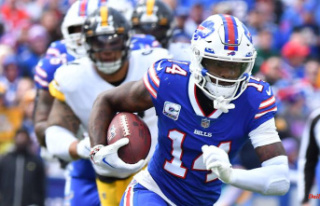The SPD also sees its election victory in Lower Saxony as a traffic light success. Only the FDP has to "accept a setback," says party leader Lindner. According to the defeated CDU candidate Althusmann, the Merkel era is partly to blame for the electoral defeat.
The electoral victory of the SPD in Lower Saxony also caused jubilation in Berlin. Chancellor Olaf Scholz congratulated Lower Saxony's Prime Minister Stephan Weil on Twitter on his election success. "The result speaks a clear language," wrote Scholz. "Citizens trust you to continue to advance Lower Saxony with a plan in the future." He does that himself, according to Scholz. "Lower Saxony remains in good hands."
With regard to a possible red-green coalition, the deputy party chairman Hubertus Heil is confident. SPD and Greens have the larger intersections, said the Federal Minister of Labor. The "declared goal" is to govern together if there is enough for a stable majority. Secretary General Kevin Kühnert sees the result as confirmation of the policy at the federal level. "The traffic light parties together got a majority of votes in Lower Saxony," said Kühnert. That gives tailwind.
The general secretary of the CDU, Mario Czaja, meanwhile admitted defeat in the state elections in Lower Saxony. "It's not a nice result for us," said Czaja on ZDF. Minister-President Weil managed to "separate himself completely from the federal trend". The defeated top candidate Bernd Althusmann blamed the years in government of former Chancellor Angela Merkel for his defeat. "The last 16 years of the CDU at the federal level - it wasn't always easy for us and was held up to us again and again as an argument in the election," said Althusmann on the Phoenix broadcaster.
The deputy CDU chairman Carsten Linnemann sees no mistakes by the current party leader Friedrich Merz in the state election campaign. "If Friedrich Merz hadn't been so committed, I think the result would have been worse," he said. In times of crisis, people vote for those in power. "Mr. Weil made full use of this official bonus, so congratulations."
The Greens see their likely strong election result as a mandate to form a red-green government in Lower Saxony. Green boss Omid Nouripour told ZDF that the result for the Greens was a "huge leap of faith". He sees the task "that we also govern". The top candidate of the Lower Saxony Greens, Julia Hamburg, has already signaled her willingness to participate in a future government. The Greens would do anything to shape Lower Saxony "in the next five years," Hamburg said to supporters of their party in Hanover.
Federal Minister of Agriculture Cem Özdemir is critical of the strong increase in votes for the AfD in Lower Saxony. The losses of the other democratic parties and the "profit for Putin fans are worrying," tweeted the Green.
The FDP, on the other hand, has to worry about entering the state parliament. In view of the weak performance, party leader Christian Lindner spoke of a "setback for the FDP". "We wanted central politics to be strengthened," he said on ZDF. "In Hanover it now looks like a left-wing majority." This is also due to the fact that the CDU campaigned against the FDP and not against red-green. His Liberals could not have given the traffic light coalition a tailwind in federal politics either. "Many of our supporters are strangers to this coalition," said Lindner.
FDP Vice Wolfgang Kubicki rules out a discussion about his party's staff after the state election. The Liberals are "a closed team," said Kubicki on ARD. This also applies to party leader Lindner.
There is a celebratory mood at the AfD, which was able to almost double its share of the vote. Despite all the resistance, the AfD "suddenly arrived in a difficult federal state like Lower Saxony," said Marzischewski-Drewes at the AfD's election party. AfD federal chairman Tino Chrupalla justified his party's gains in votes in Lower Saxony with the dissatisfaction of many citizens with the traffic light coalition in Berlin. The AfD is the only party that the federal government is "driving along," said Chrupalla in Hanover.
Linke leader Janine Wissler was disappointed with the poor performance of her party. But the chairman of the federal party was also combative. There will be at least three state elections next year, and preparations will be made for them. "We need a strong left-wing opposition in parliament, not only at federal level but also in the federal states, and that's what we're fighting for," said Wissler.












